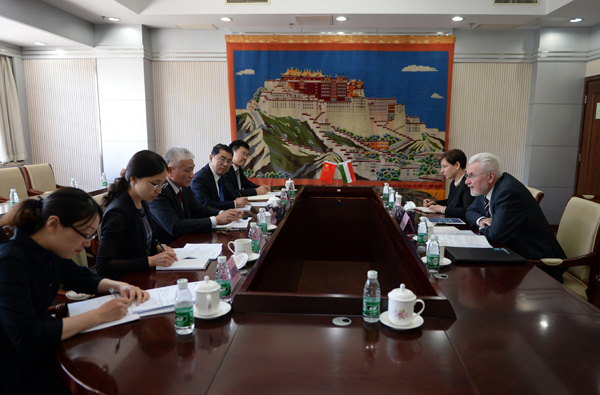
In the presence of the Chinese Premier Li Keqiang and Hungarian Prime Minister Viktor Orban who was in China for an official visit and the Belt and Road Forum for International Cooperation, China and Hungary formally signed an MOU between the Ministry of Science and Technology (MOST) of the People’s Republic of China and the National Research, Development and Innovation Office (NRDI Office) of Hungary on Joint Funding to Research and Development Projects on May 13th, 2017. Wang Zhigang, Party Secretary and Vice Minister of MOST, and József Pálinkás, President of the NRDI Office, signed the MOU on behalf of the two sides. The signing and implementation of the MOU is of ground-breaking significance. MOST and the NRDI Office will jointly support scientific research institutes, higher learning institutions and enterprises of the two countries to conduct joint R&D and cooperation on the commercialization of R&D outcomes in priority areas agreed by the two sides, which will bring new opportunities for upgrading bilateral cooperation on science, technology and innovation.
On the same day, Wang and Pálinkás had a bilateral talk at MOST. They exchanged views and reached broad consensus on deepening China-Hungary cooperation on science, technology and innovation.
Wang welcomed President Pálinkás’s visit to China and introduced China’s innovation-driven development strategy and progress of S&T innovation. He offered the Chinese side’s ideas and suggestions for the second China-CEEC Conference on Innovation Cooperation. He acknowledged Hungary’s strength in scientific research and expressed China’s commitment to cooperation on science, technology and innovation with Hungary. China is ready to work with Hungary to seize the opportunity of the Belt and Road Initiative and leverage the platform of China-CEEC cooperation to further promote cooperation on the research of biological, environmental and energy technologies with the guidance of the China-Hungary Inter-governmental Committee on Cooperation in Science and Technology, implement the MOU on joint R&D projects, enhance the mobility of science and technology personnel, especially the exchange of young R&D personnel on academic topics, innovation and entrepreneurship, build a bilateral platform for science and technology cooperation, encourage relevant agencies to build joint R&D centers, incubators for the commercial application of R&D outcomes and other long-term cooperation platforms, and promote the sustainable development of China-Hungary science and technology cooperation.
Pálinkás introduced the mandate of the NRDI Office, the current status of science, technology and innovation in Hungary and the building of the ELI Attosecond Light Pulse Source (ELI-ALPS). He commended the Belt and Road as a landmark initiative, and stated Hungary’s readiness to take part in the initiative and promote bilateral cooperation on science, technology and innovation, especially applied research and cooperation on major scientific research infrastructures, in order to boost the sustainable economic growth of the two countries.
Wang and Pálinkás presented the signed MOU at the Thematic Session on People-to-people Connectivity of the Belt and Road Forum for International Cooperation on the afternoon of May 14th 2017.

